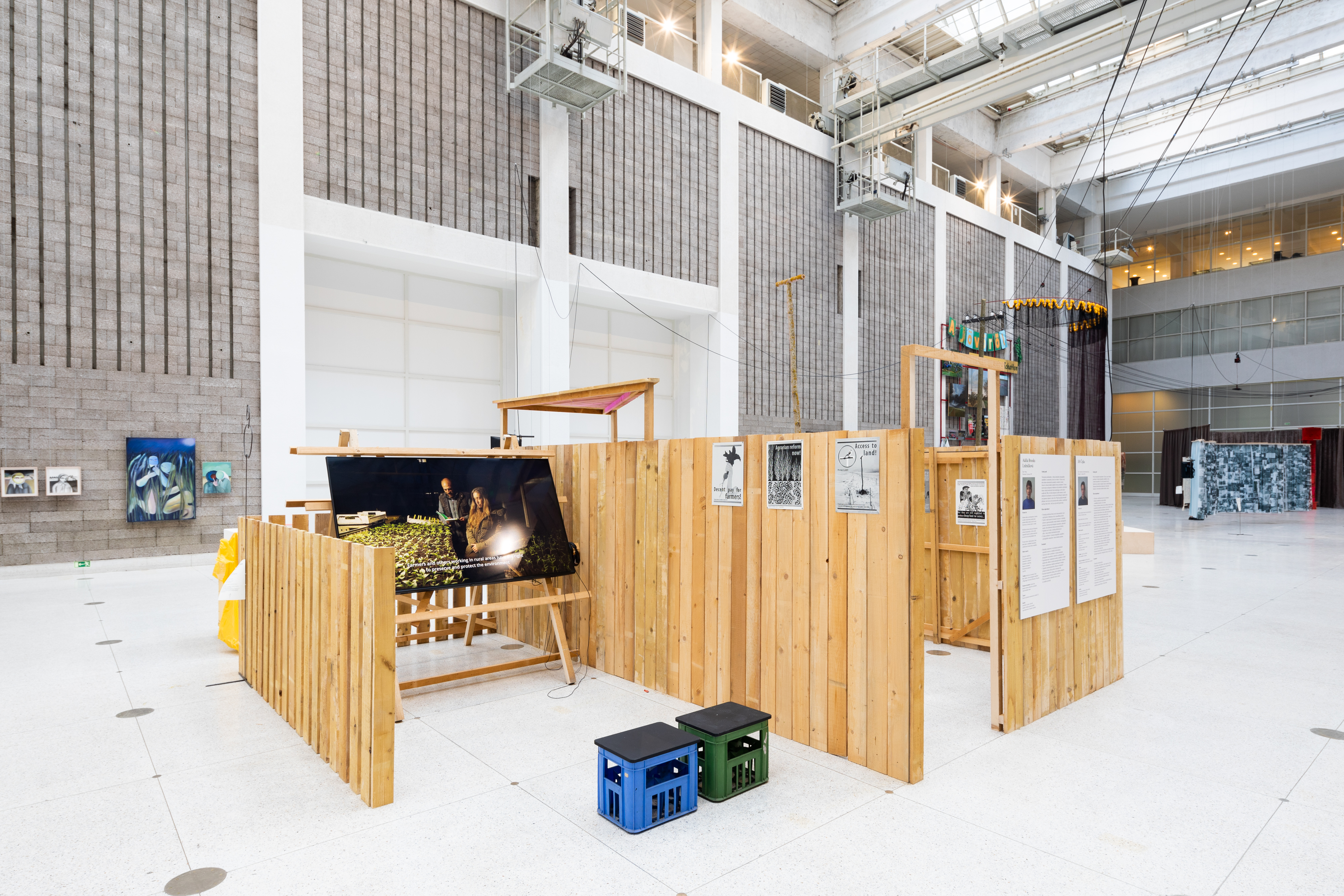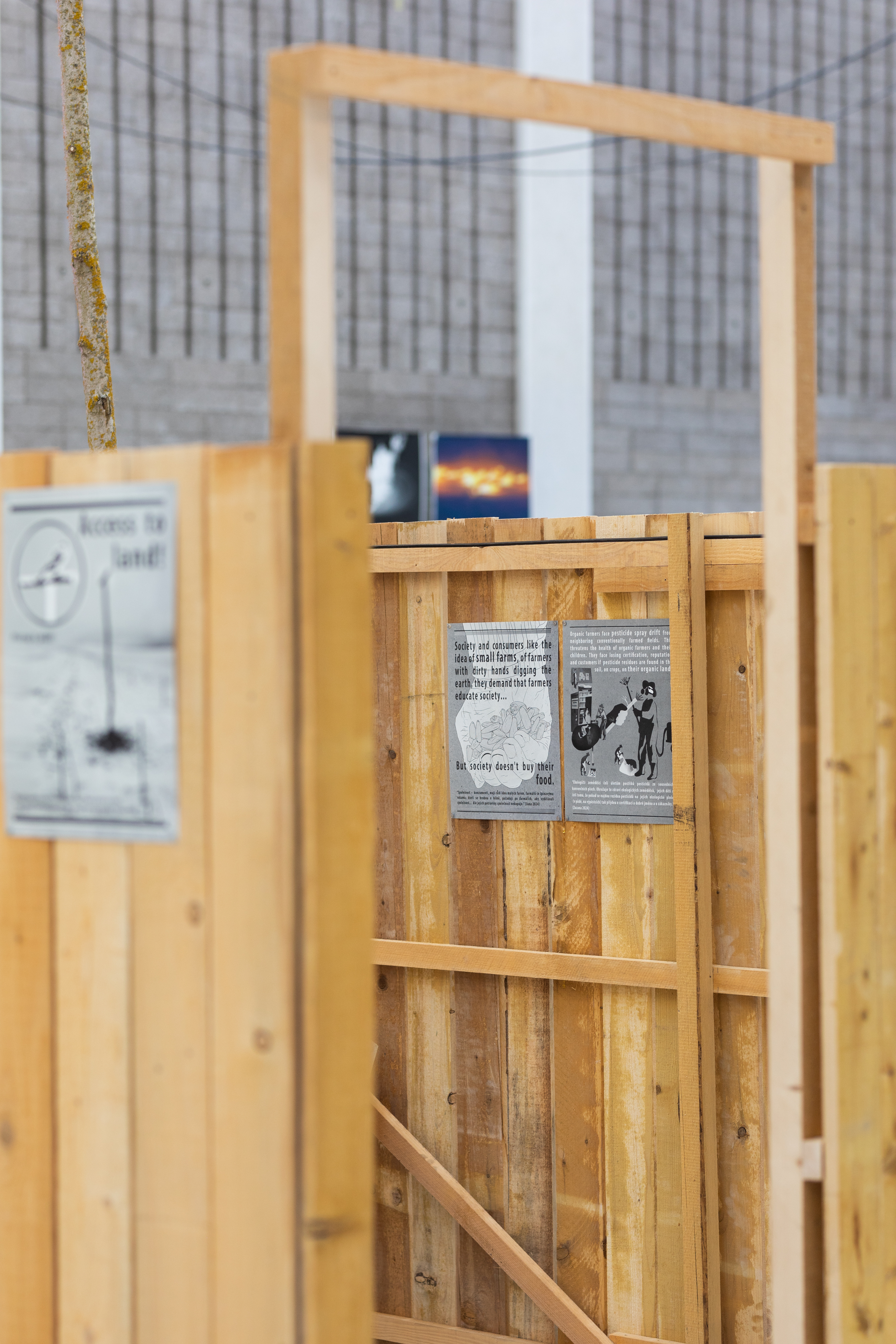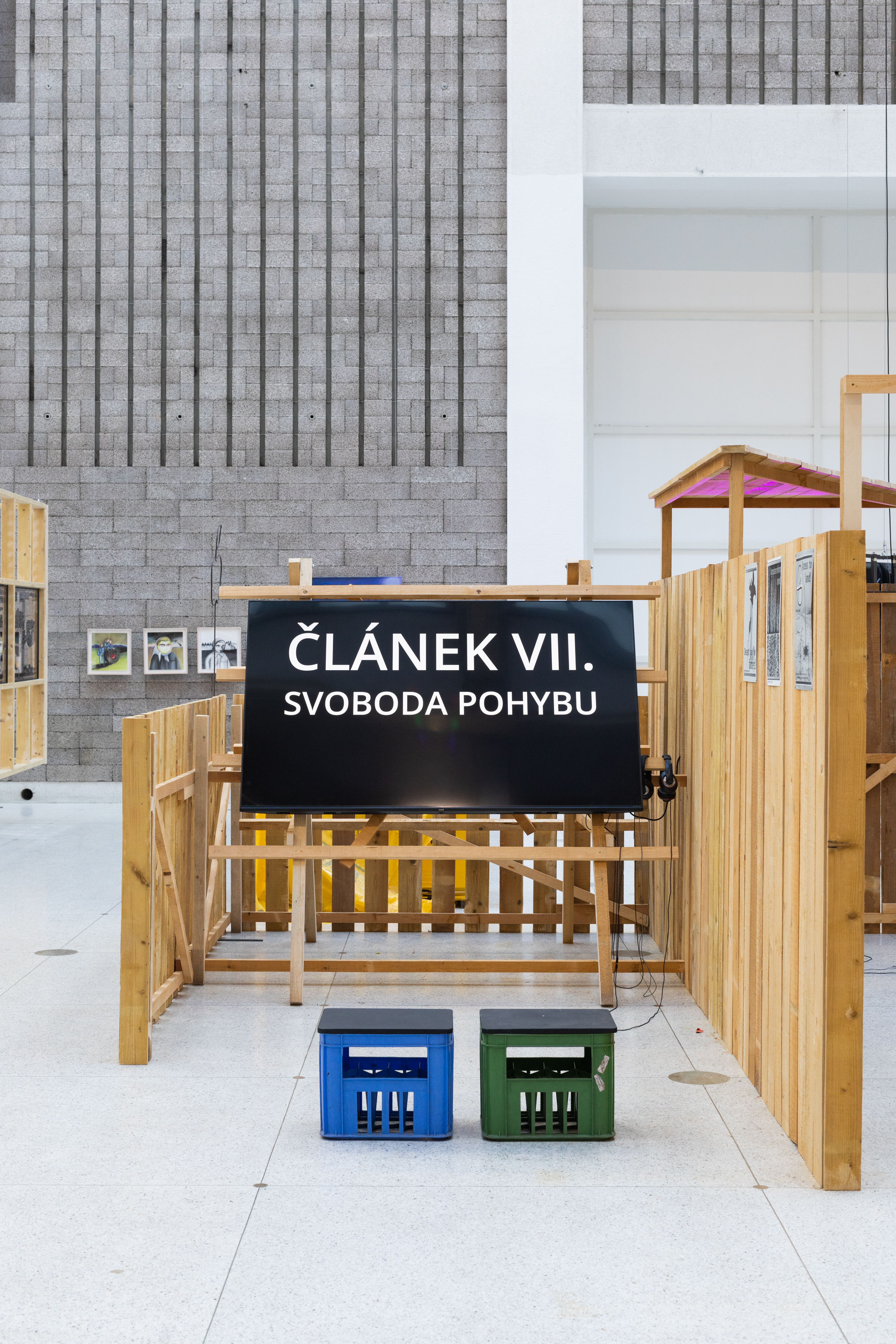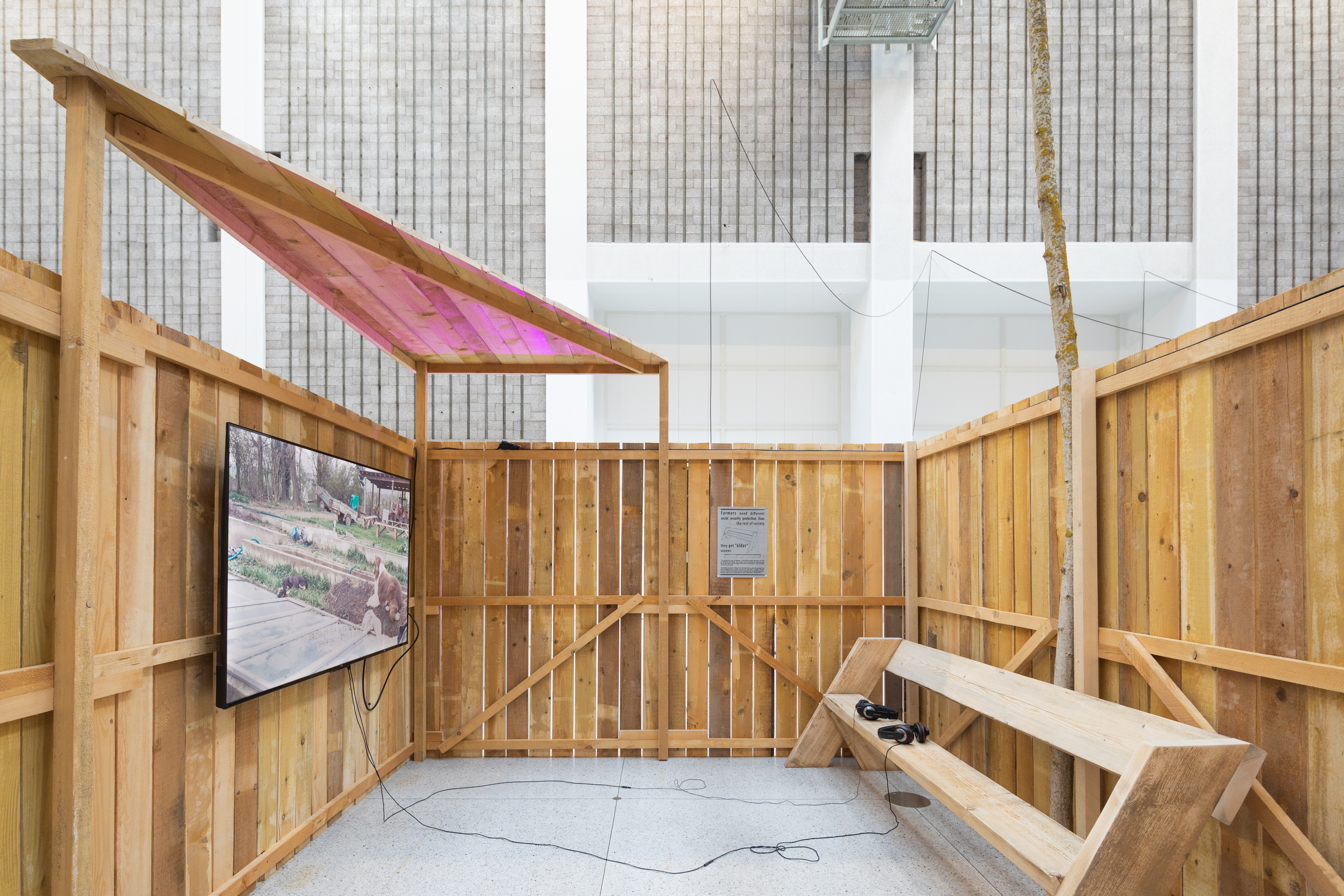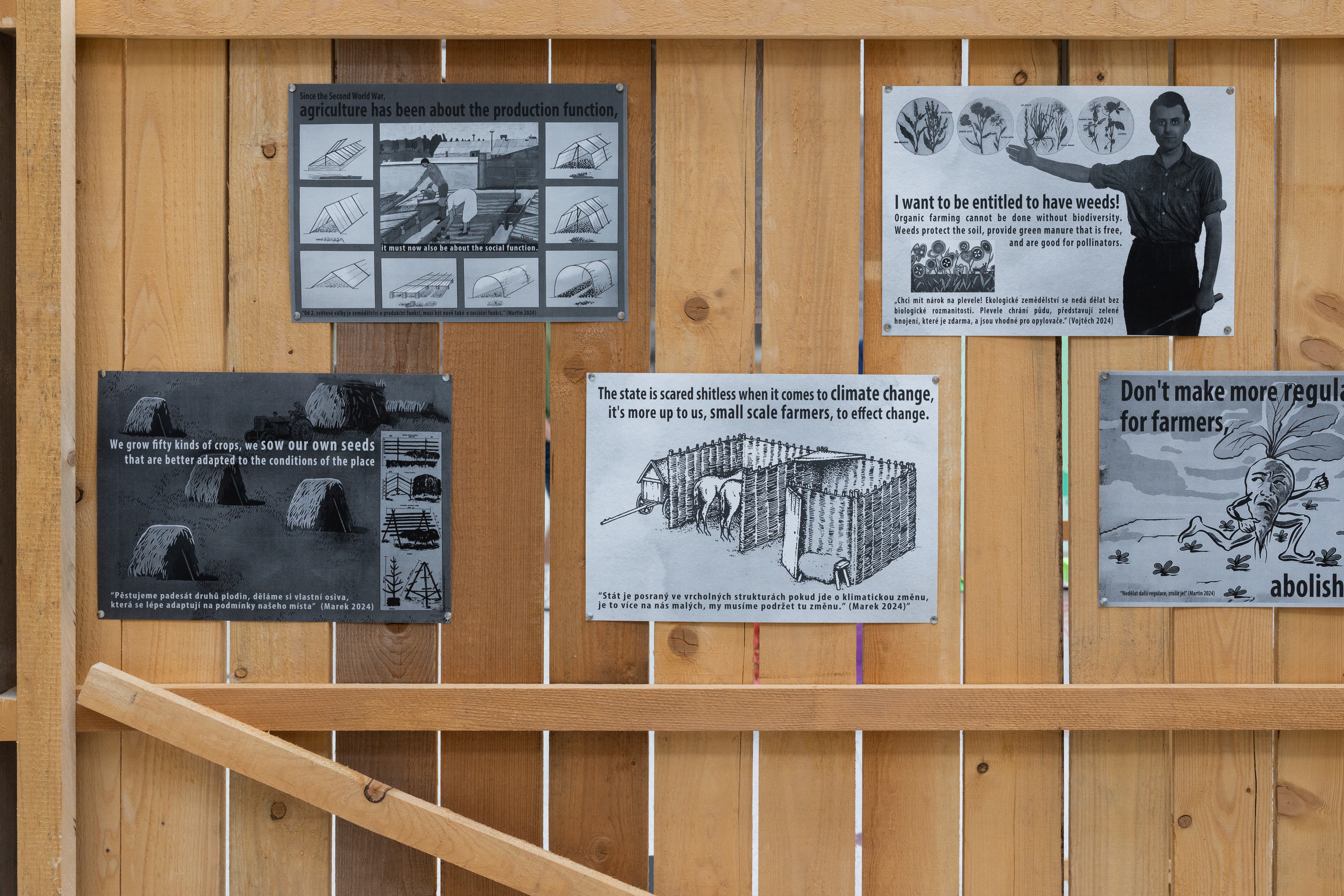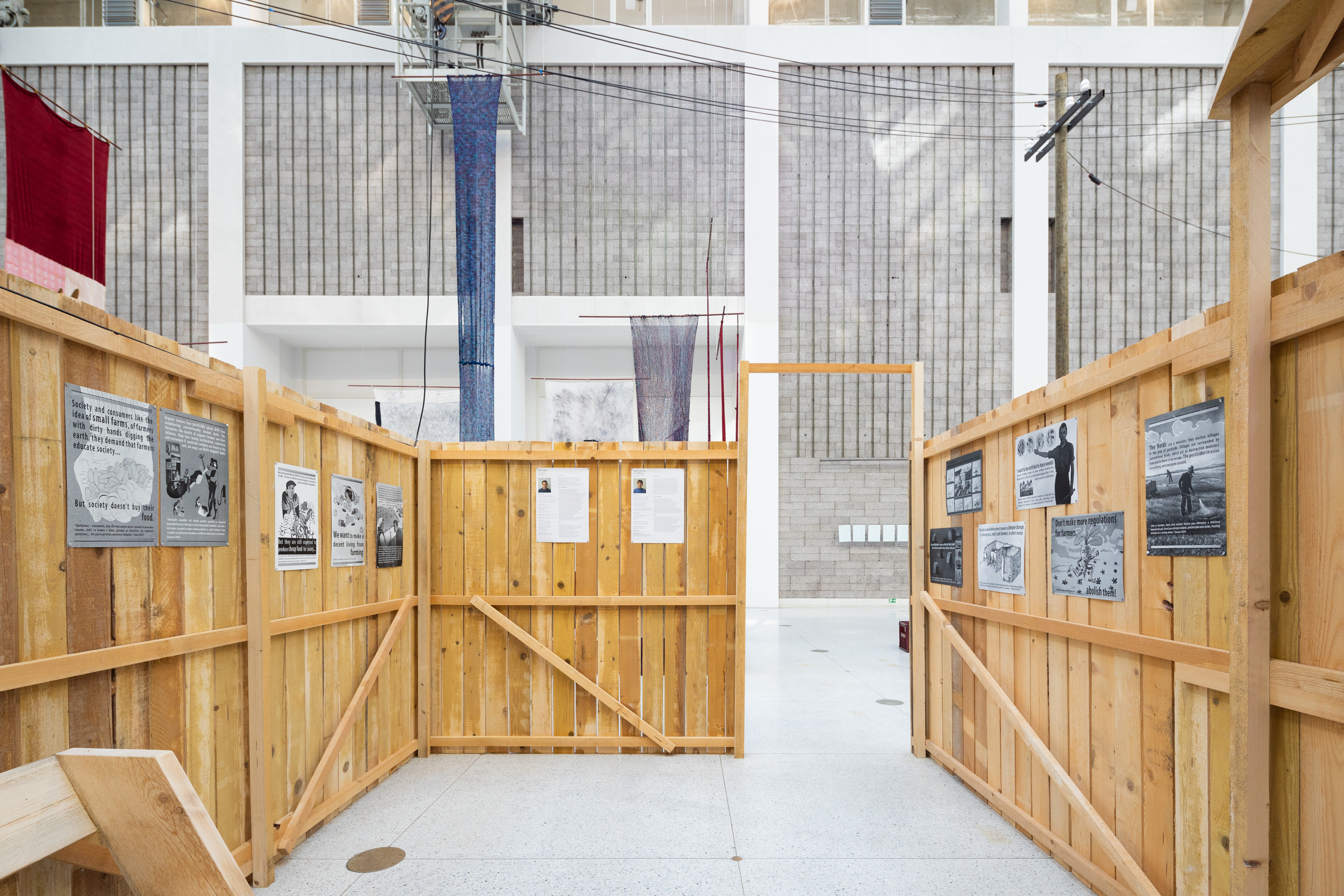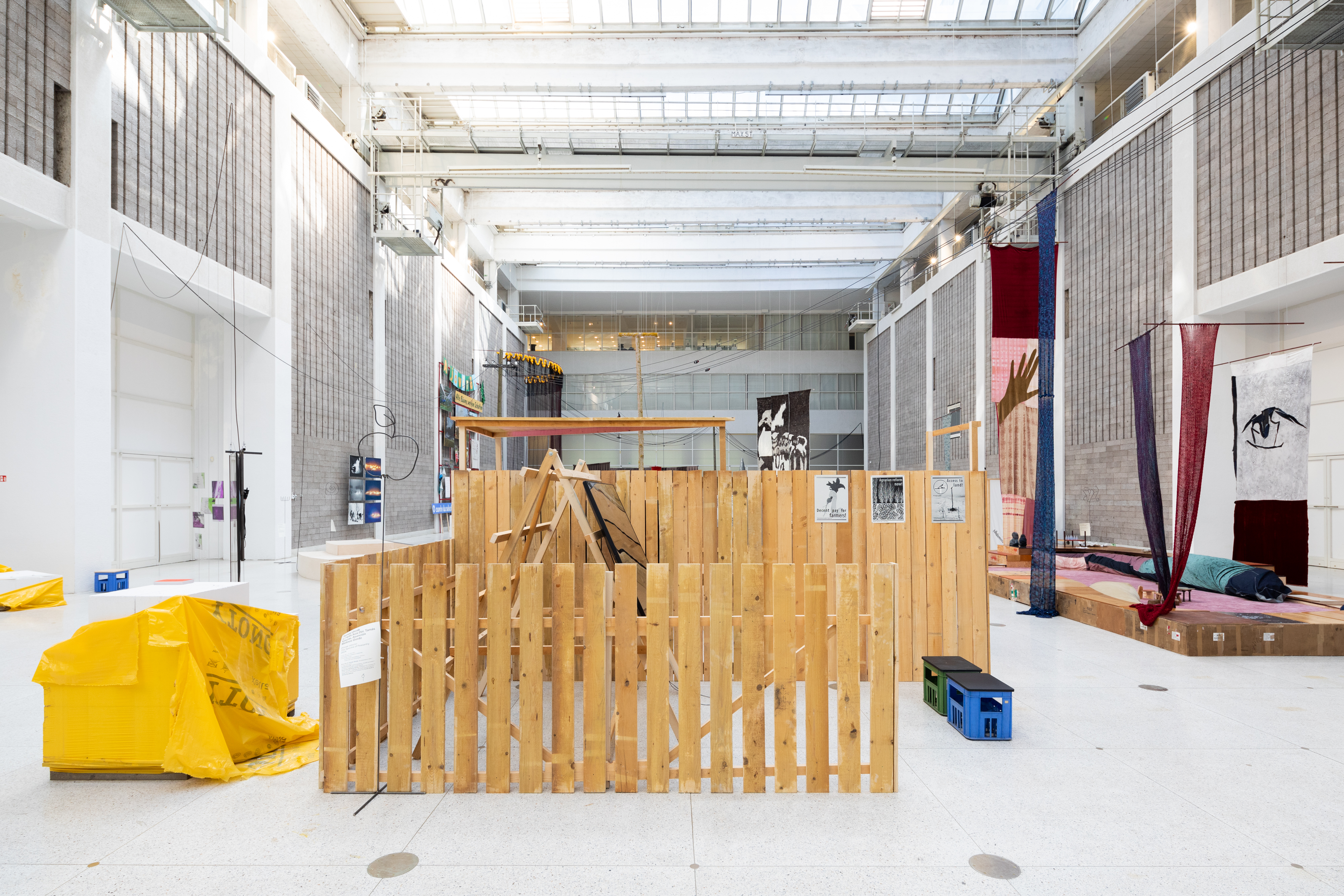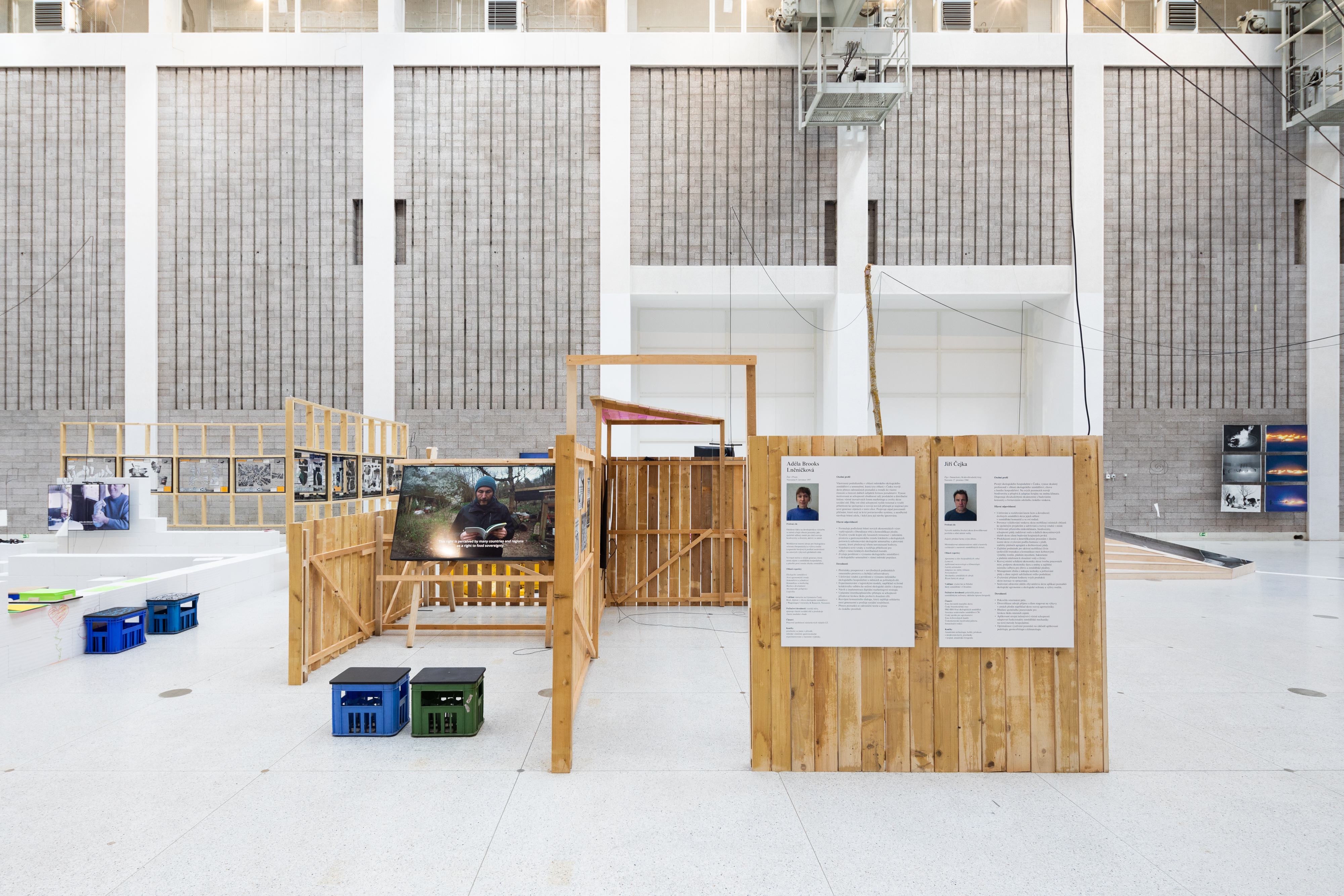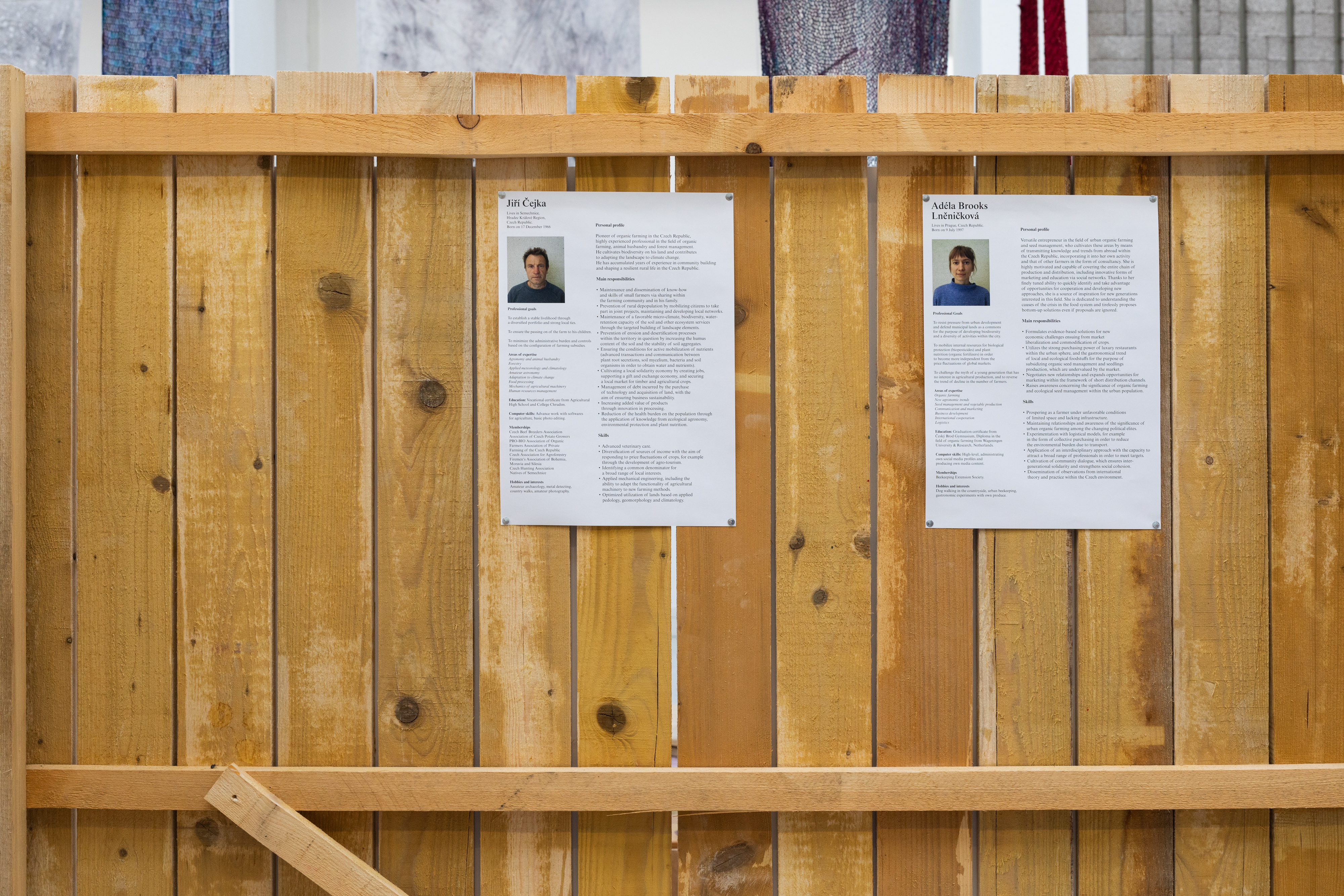Tomáš Uhnák with Asia Dér, Tamás Kaszás and Ascunción Molinos Gordo
In collaboration with Adam Čajka, Ramona Duminicioiu (Eco Ruralis, Romania), Anna Kárníková
Work exhibited in the Trade Fair Palace:
The Spectre of Peasantry / 2024 / multimedia installation / 2-channel video (3 min 46 s, 17 min 59 s), audio, paper, wood / courtesy of the artists
* Commissioned by the Biennale Matter of Art Prague.
The Spectre of Peasantry, 2024, Biennale Matter of Art 2024, National Gallery Prague – Trade Fair Palace (c) Jonáš Verešpej
There are around 2.2 billion peasants in the world today, more than ever before in human history. They produce 70–80% of our food, they care for nature and resources. But they also face many difficulties: land grabbing, displacement, or other forms of violence and oppression. This is why La Via Campesina, an international peasant movement initiated the United Nations Declaration on the Rights of Peasants and Other People Working in Rural Areas (UNDROP). For 20 years it fought for the UN General Assembly to adopt the declaration. This happened in 2018 and it was a great victory: the declaration supports new human rights, specifically for peasants, and helps them fight injustice.
But who and where are the peasants in the Czech Republic? Since the Velvet Revolution, the word “peasant” is hardly used anymore. For his new project at Matter of Art, Tomáš Uhnák starts discussions with small farmers around the Czech Republic. He wants to see if the rights supported by UNDROP are important to them. Czech farmers may not identify as peasants, their realities might be different from their colleagues’ in the global South, but they have similar concerns. They all fight for their right to land, for better access to the market and better living conditions. They want recognition for their work, both politically and socially. Tomáš collaborates with artists and activists, who share his interest in the struggles of small farmers. Together they realize an installation and public events on the importance of the peasantry today.
Tomáš Uhnák (lives in Prague, b. Bratislava (SK), 1984) received his master’s degrees from the Academy of Fine Arts in Prague and from the food policy program at City, University of London. He is currently a PhD student and research fellow at the Czech University of Life Sciences, researching discursive, ideological, social, and material formations of agro-food paradigms and regimes, alternative food networks, organic agriculture, and theories of transformation of food systems. He is a member of the Association of Local Food Initiatives (AMPI), where his agenda involves community-supported agriculture, food sovereignty, and agroecology. He contributes regularly to academic journals and a number of Czech and international magazines on the topics of the social aspects of agriculture and the political economy of food systems. He is a food policy advisor, an agricultural consultant, and a fruit cultivator with a focus on agroforestry and heirloom fruit varieties. In his art practice he thematizes the theory of metabolic rift and uses food as a political and social tool. In 2016 Uhnák participated in the art residency and research project Kassandras in Athens, Greece, where he researched the politics of food aid and worked as a volunteer implementing food self-provisioning structures in a refugee camp. While there, he also researched the positionality and resiliency of art collectives in Athens.Also in 2016, he participated in the Delfina Foundation Art Residency (in the Politics of Food program) in London. As part of the program, he organized a psychogeographical tour through London called Politics of Societal Digestion.He also completed a research residency at the Rural Sociology Group at Wageningen University & Research in the Netherlands in 2022.His latest exhibitions include Metabolic Rift (VI PER Gallery, Prague, together with Jirka Skála, 2023), the collective exhibition Thinking through Images (Prague City Gallery, 2023), and Miam! (Garage COOP, Strasbourg, 2023).
Tamás Kaszás (lives in Szigetmonostor, b. Dunaújváros (HU), 1976) is an artist who graduated from the Intermedia Department of the Hungarian Academy of Fine Arts, where he is now a teacher. He usually creates complex projects inspired by theoretical research, applying both traditional and new media in his works. By mixing poetic images with useful inventions in his exhibition practice, individual works of art appear mostly as constellations within the larger framework of installations called visual aid constructions. His projects are based on social and ecological issues and spiritual practices. Keywords like collapse and survival, self-sustainability and autonomy, theory vs. practice, folk science, fictional anthropology, and living in nature might give us an idea about his most prevalent topics. He is a member of two artist duos: Randomroutines (with Krisztián Kristóf, since 2003) and Ex-artists’ Collective (with Anikó Loránt, 2003–2020). SAVAGE INTERN, solo exhibition, Hungarian National Gallery, Budapest, Hungray, 2023; 40th EVA International – Ireland’s Biennial of Contemporary Art, Limerick, Ireland, 2023; documenta fifteen, Kassel, Deutschland, 2022; With Heart and Mind, solo exhibition, Trafó, Budapest, Hungary, 2021; SCI FI AGIT PROP, solo exhibition, de Appel, Amsterdam, Netherlands, 2018; Joy of Surviving, solo exhibition, Calouste Gulbenkian Museum, Lisbon, Portugal, 2017; Exercises in Autonomy, featuring Anikó Loránt (ex-artists' collective), exhibition, Muzeum Sztuki, Łodz, Poland, 2016
Asia Dér (lives in Budapest, b. Bratislava (SK), 1985) graduated as a documentary film director at the DocNomads MA program. Her first feature (co-directed with Sári Haragonics) Her Mothers was shown at more than 30 international film festivals and won several awards, among them Best Film Award at Moscow International Documentary Film Festival DOKer and Crossing Europe Film Festival Linz. The film was made in co-production with HBO and was supported by the Sundance Institute post-production fund. Her second feature-length documentary, I Won't Die, had its international premiere at the A-category Warsaw Film Festival in 2023. She is an alumnus of ZagrebDox Pro, and CIRCLE Women Doc Accelerator and participated at East Doc Platform, Cannes Docs, and the Docu Rough Cut Boutique. She will pursue her doctoral degree in 2024. Asia is a lecturer and mentor at Freeszfe and Docnomads MA program and a Hungarian Documentary Association (MADOKE) board member.
Asunción Molinos Gordo (lives between Madrid and Cairo, b. Burgos (ES), 1979) is a researcher and visual artist. Her practice is strongly influenced by disciplines such as anthropology, sociology, and cultural studies. The main focus of her work is the contemporary peasantry. Her work questions the categories that define “innovation” in the current dominant discourse and explores different forms of intellectual domination, from the urban to the rural. She has produced projects reflecting on land use, nomadic architecture, peasant strikes, bureaucracy over territory, the transformation of rural labor, biotechnology, and the international food trade. Molinos Gordo won the 2015 Sharjah Biennial Prize with her project WAM (World Agriculture Museum) and represented Spain at the 13th Havana Biennial in 2019. Her work has been exhibited at institutions around the world, including Jameel Arts Centre (Dubai, AE), IVAM (Valencia, ES), Victoria & Albert Museum (London, GB), Delfina Foundation (London, GB), ARNOLFINI (Bristol, GB), The Townhouse Gallery (Cairo, EG), Darat Al Funun (Amman, JO), tranzit (Prague, CZ), Cappadox Festival (Uçhisar, TR), The Finnish Museum of Photography (Helsinki, FI), Museo de Arte Carrillo Gil (Mexico City, MX), MAZ Museo de Arte de Zapopan (Guadalajara, MX), MUSAC (León, ES), CA2M (Madrid, ES), CAB (Burgos, ES), Matadero (Madrid, ES), and La Casa Encendida (Madrid, ES), among others.
Ramona Duminicioiu is a peasant / small-scale farmer from Ionești commune in Vâlcea County, Romania. She is the president of the association Eco Ruralis, which represents the interests of almost 20,000 peasants at the national level. She is part of the coordination committee of the Ukrainian Rural Development Network (URDN), a public union that brings together over two million citizens of Ukraine. She is involved in the coordination of BILIM, a regional alliance for the development of agroecology and the implementation of peasants’ rights in Eastern Europe and Central Asia. Between 2016 and 2020 she was part of the coordination committee of the peasant confederation Via Campesina Europa (ECVC). From 2017 to 2021 she was part of the coordination committee of the Civil Society and Indigenous Peoples’ Mechanism for relations with the United Nations Committee on World Food Security (CSIPM-CFS). In 2018, she played the role of an expert in the final negotiation session of the UN Declaration on the Rights of Peasants and Other People Working in Rural Areas (UNDROP), adopted that same year by the Human Rights Council in Geneva and later by the UN General Assembly in New York. On her farm in Ionești, Duminicioiu cultivates grapes, corn, and vegetables together with her extended family.
Asia Dér and Ramona Duminicioiu completed artist residencies in Prague in 2024, as part of the Biennale Matter of Art 2024, which was funded by the European Union – NextGenerationEU.
